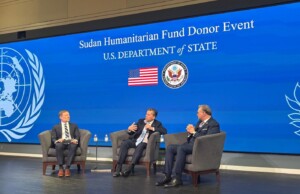Ministry: No impunity for crimes against journalists in Sudan
Sudan’s Ministry of Culture and Information has pledged that crimes committed against journalists under the former regime will not pass without accountability.
 International Day to End Impunity for Crimes against Journalists (UNESCO)
International Day to End Impunity for Crimes against Journalists (UNESCO)
Sudan’s Ministry of Culture and Information has pledged that crimes committed against journalists under the former regime will not pass without accountability.
Following the International Day to End Impunity for Crimes against Journalists on November 2, the Sudanese press focussed on crimes against Sudanese journalists on Tuesday.
Rashid El Saeed, First Undersecretary of the Ministry of Culture and Information, said in a press conference in Khartoum on Tuesday that ending impunity for such crimes is a national issue after 30 years of dictatorship.
Punishment will start from the highest levels of the state in the former regime, he said, stressing the absence of impunity. He explained that “awareness has prompted the Sudanese people to revolt against the crimes committed”.
The undersecretary pointed out that there is optimism to face all challenges, dismantle the deep state and the state of empowerment and create a better press environment that will lead the country to complete democratic transformation and just peace.
No red lines
He stressed that there are no red lines for cases or persons unless individual freedoms are affected, and that he is prepared to work with the United Nations to develop a national plan to combat impunity, as well as to accept proposals for an integrated team to work towards press freedom.
“Freedom is the basis and laws come to regulate relations and clarify the rights and duties,” El Saeed stated. adding that “peace is a major issue and a key task for the transitional government.”
He noted noting that stopping the war reduces violations against journalists, pointing out the need to provide the necessary training to catch up with development in the field of media.
Press freedom
As reported by Radio Dabanga on Monday, on the occasion of the International Day to End Impunity for Crimes against Journalists, Sudan’s Minister of Culture and Information Feisal Mohamed Saleh reiterated the Sudanese government’s commitment to guarantee freedom of press in the country.
Saleh, who himself suffered persecution and detention at the hands of the Al Bashir regime as an outspoken writer and journalist, and was winner of the 2013 Peter Mackler Award for Courageous and Ethical Journalism.
In his statement on Saturday, he said “the government will prevent any kind of harassment, abuse, threats or pressure in any form against journalists. Crimes against journalists by individuals or groups will be dealt with swiftly.”
Radio Dabanga’s editorial independence means that we can continue to provide factual updates about political developments to Sudanese and international actors, educate people about how to avoid outbreaks of infectious diseases, and provide a window to the world for those in all corners of Sudan. Support Radio Dabanga for as little as €2.50, the equivalent of a cup of coffee.












 and then
and then